Table of contents
Which tea has diuretic power?
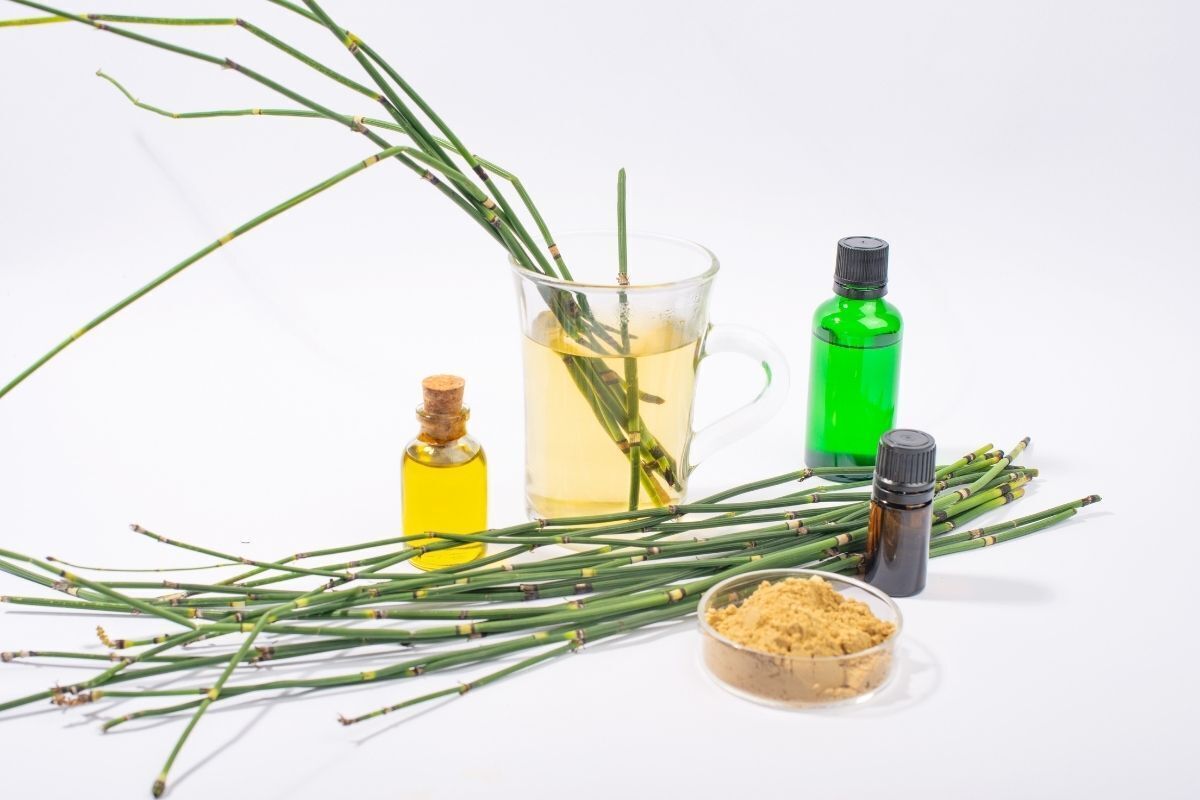
All medicinal plants have diuretic power when consuming the tea, because there is a stimulus in the production of urine. However, there are some herbs and roots that concentrate more diuretic properties capable of eliminating fluid retention, swelling and increase fat burning in the body.
In addition, diuretic teas are effective in the prevention and treatment of various diseases, mainly, of the urinary system, such as urinary infections, kidney stones and cystitis. However, it is very important that the doctor or herbalist is consulted before making the intake of any type of tea.
Therefore, to help you, we have listed the main teas with diuretic powers that will be beneficial not only to help you lose weight, but also in the functioning of the whole organism, making it healthier and have quality of life.
Hibiscus tea
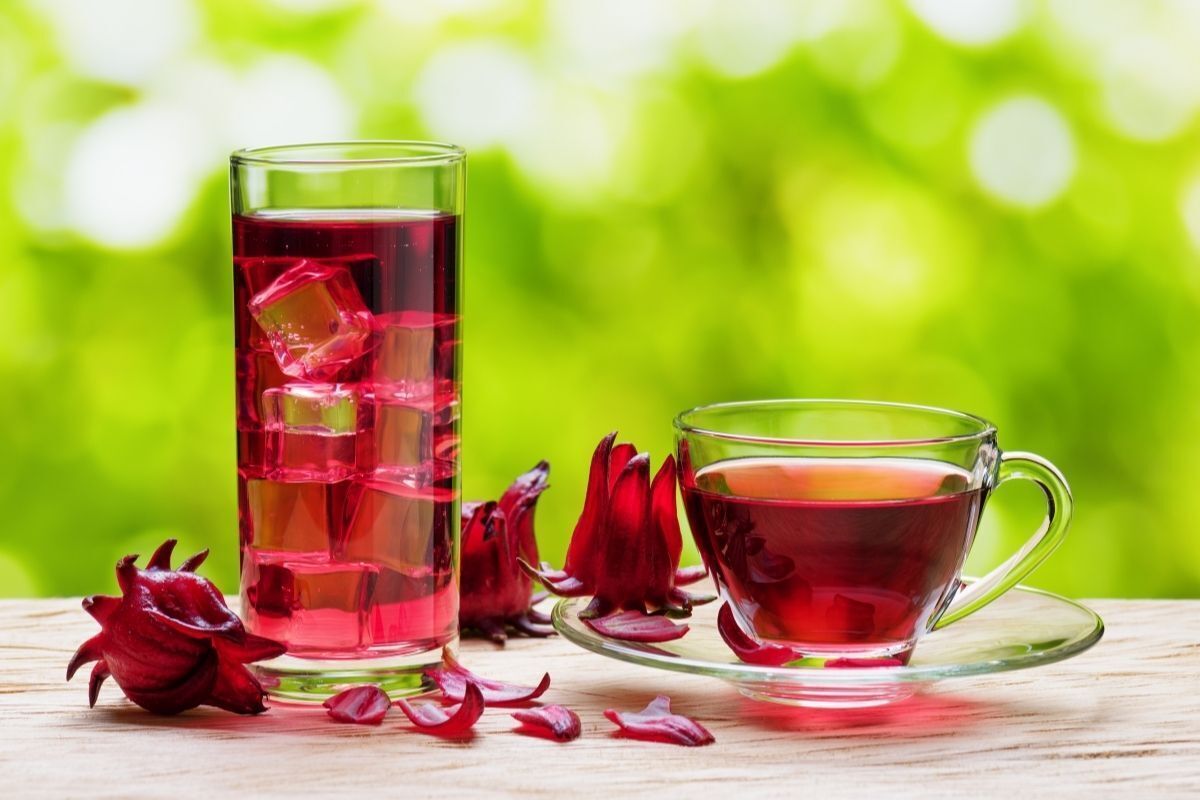
The hibiscus is a medicinal plant famous for containing properties that assist in the process of weight loss, mainly for its diuretic effect, eliminating fluid retention, swelling and abdominal discomfort.
This is due to flavonoids, anthocyanins and chlorogenic acid, properties present in hibiscus, which regulate aldosterone, a hormone responsible for controlling urine production.
Ingredients
Use the following ingredients to make the tea:
- 1 liter of water;
- 2 tablespoons of the hibiscus flowers, preferably dehydrated.
If you can not find dried hibiscus, you can make tea with two sachets or a teaspoon of powdered herb in 300 ml of water.
Directions
To prepare the tea, start by heating the water in a pot until it boils and turn off the heat. Add the hibiscus, cover the container and let it infuse for about 10 minutes. Once it is at a suitable temperature, strain and serve unsweetened.
Despite being an herb that offers no risk to health, do not consume hibiscus tea during menstrual period, pregnancy, breastfeeding and if the pressure is low. In addition, to enhance the diuretic effect make its use twice a day after the main meals.
Horsetail tea
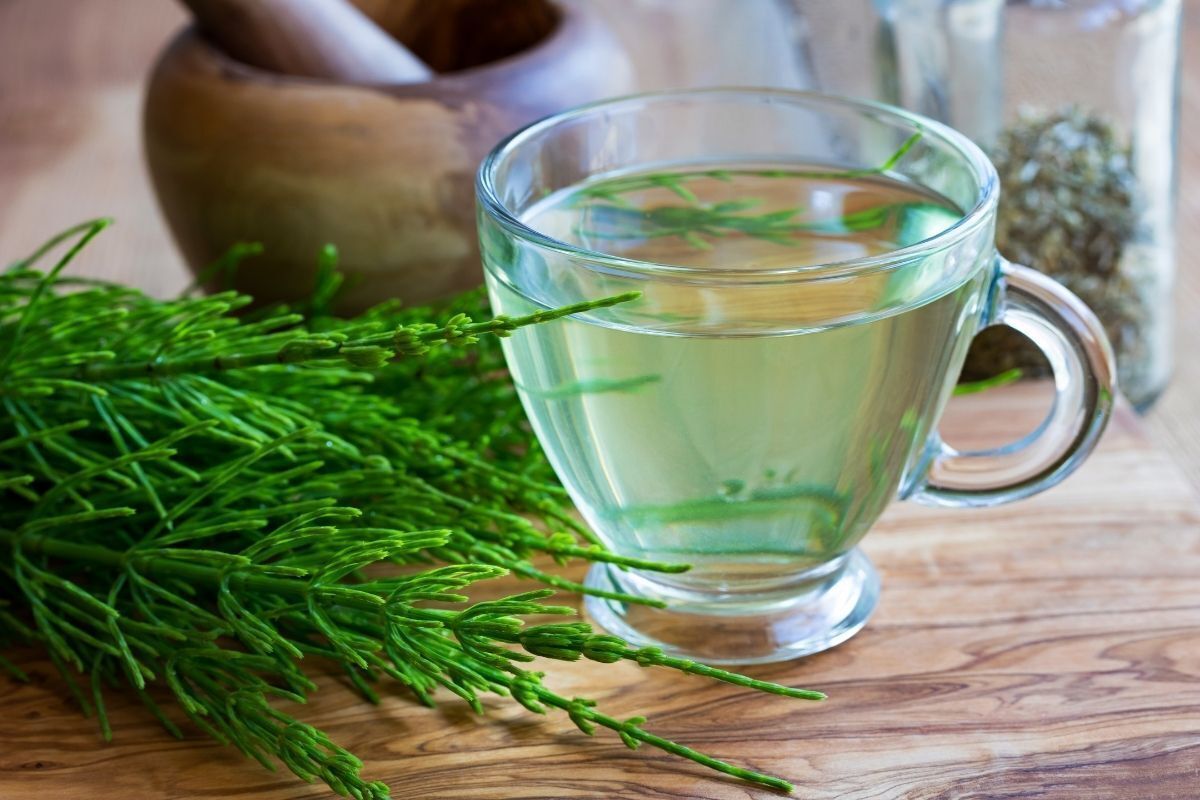
Horsetail is a diuretic herb indicated for people suffering from problems in the urinary system or who need to eliminate toxins from the body that cause fluid retention. In addition, the properties contained in this plant help regulate blood pressure, weight control and strengthen bones and many other benefits.
Ingredients
Use the following ingredients to make the tea:
- 1 cup water, about 200ml;
- 1 tablespoon of horsetail. Most commonly, the preparation is made with the dried stalks of the herb.
Directions
Heat the water in a kettle, turn off the heat before boiling. Add the horsetail, cover and let it brew for approximately 10 to 15 minutes. Strain the tea and drink it still warm. If you prefer, associate it with other medicinal herbs or aromatic spices to enhance its effect and give it more flavor.
Horsetail tea should not be ingested for more than a week, so as not to cause dehydration and loss of important nutrients for the body. In addition, its exaggerated consumption can cause inflammation and headache. Pregnant and lactating women and children should avoid its use.
Dandelion tea
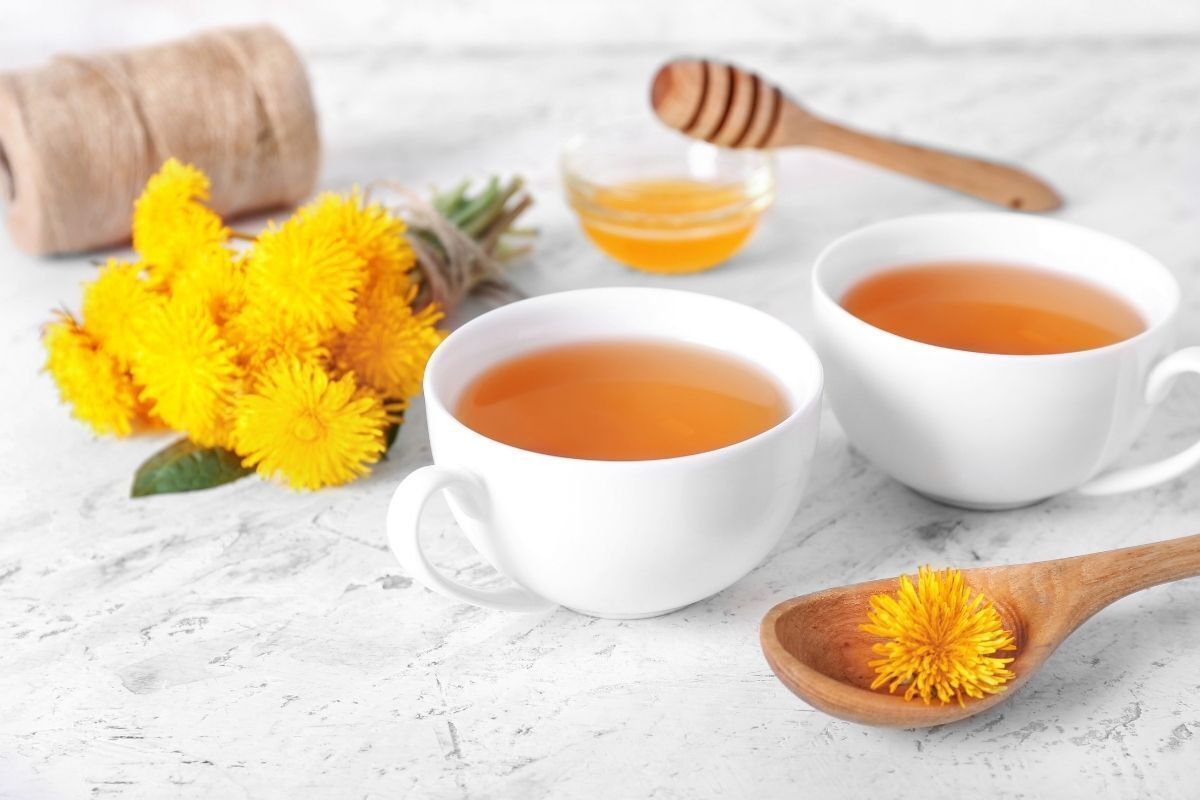
Dandelion is a popular plant in Eastern medicine for treating various diseases, especially for its diuretic effect, because it contains in its composition potassium, a mineral that acts in the kidneys by increasing the level of urine.
Therefore, the tea made from this herb eliminates toxins from the body, acting on fluid retention and reducing body swelling, besides helping in the treatment of urinary tract infections, such as cystitis and nephritis.
Ingredients
Use the following ingredients to make the tea:
- 1 tablespoon or 15g of the roots and leaves of dandelion;
- 300ml of water.
Directions
Heat the water until it boils, then turn off the heat and add the dandelion. Cover and let it infuse for about 10 minutes. Allow it to cool and strain, this tea can be consumed two to three times a day. However, drink this tea before meals if you have any digestive problems.
Dandelion is considered a very safe plant and therefore does not cause serious side effects. However, avoid consuming it during pregnancy or if you suffer from any gastrointestinal ailment. It is rare, but in some cases, this herb can cause allergy, generating a condition of intestinal irritation. Therefore, consult a doctor or herbalist before ingesting it.
Parsley tea
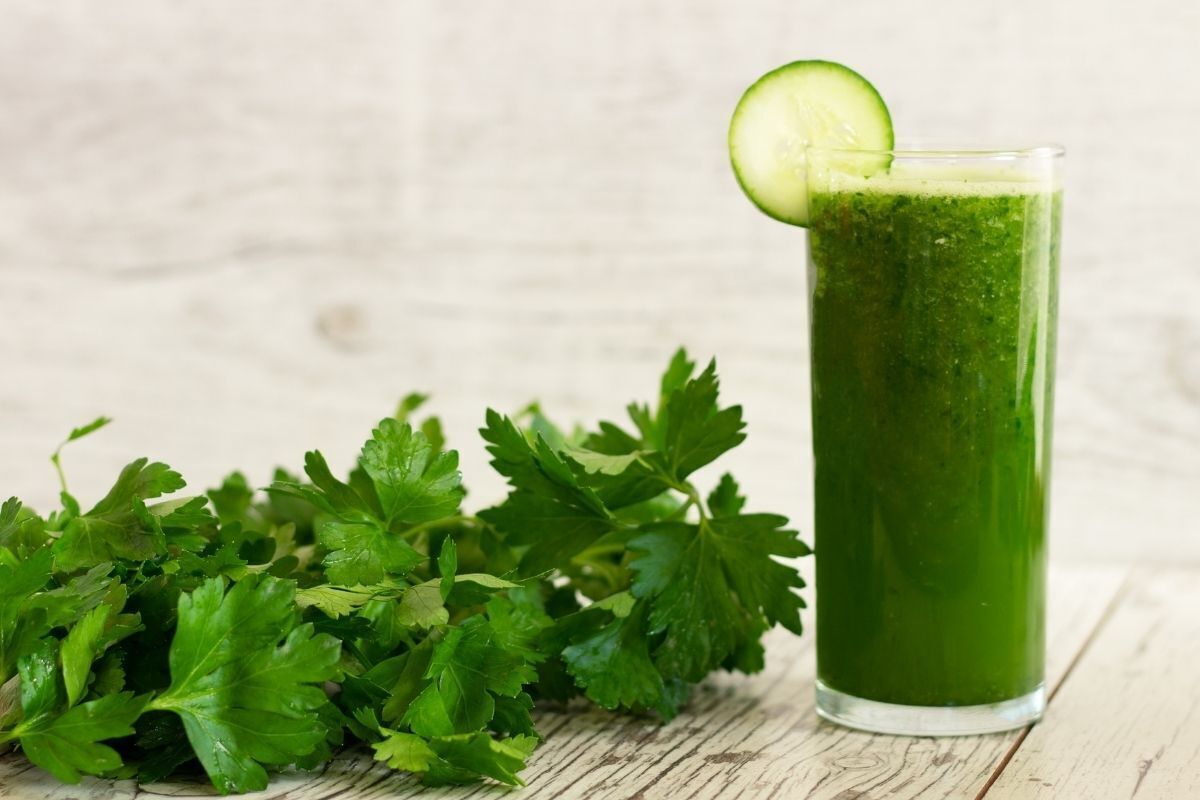
Very popular for its diuretic action, the parsley tea has several properties that act on the functioning of the whole body, especially in the kidneys, where it stimulates the organ in the production of urine. Thus, preventing against kidney stones, fluid retention, hypertension, weight gain and many other health benefits.
Ingredients
Use the following ingredients to make the tea:
- One cup of water, equivalent to 250 ml;
- 1 bunch of fresh parsley, use even the stalk or if you prefer 25g of the herb;
- ¼ of lemon juice.
Directions
Place the water in a pot and heat it up, but do not boil. Then chop or macerate the parsley and add it to the container along with the lemon juice. Cover and let the tea brew for at least 15 minutes and serve.
Parsley tea has no serious contraindications and can be ingested two to three times a day. However, for cases of severe kidney disease and chronic, it is not recommended consumption, nor for pregnant or breastfeeding.
Fennel tea
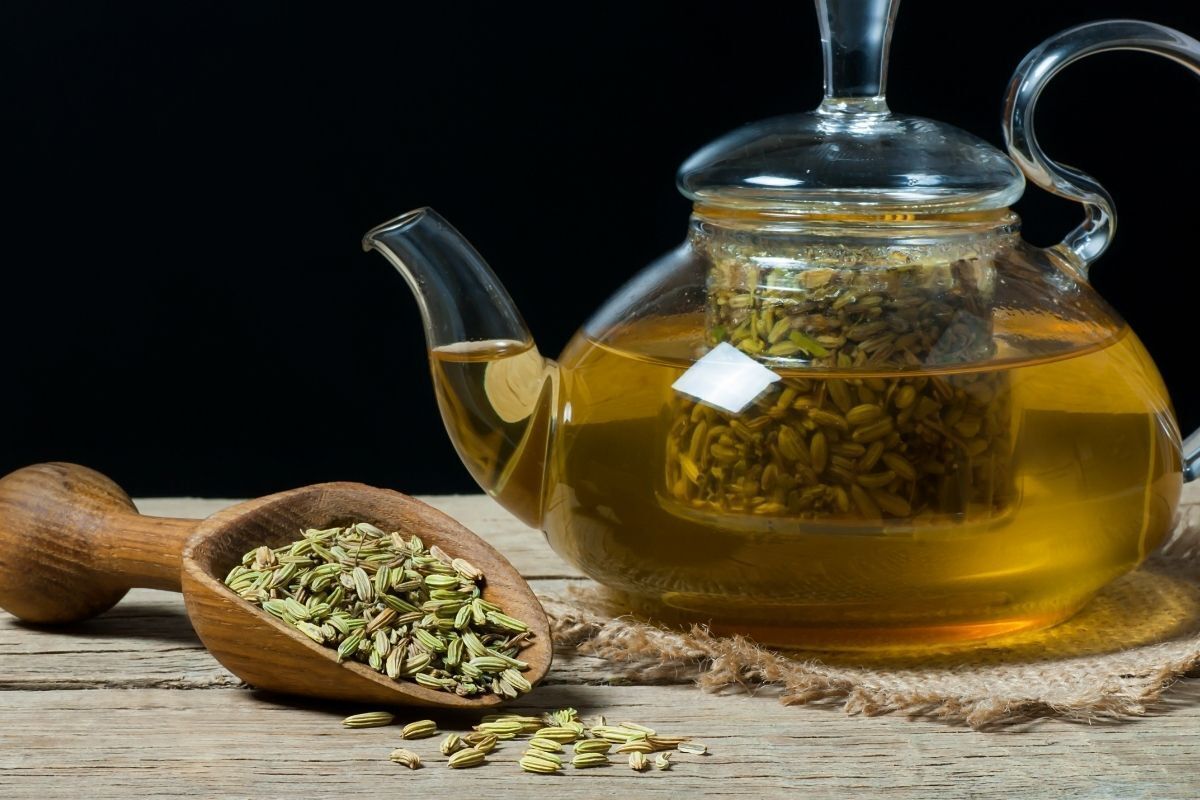
Fennel is a medicinal herb well known for having diuretic action and properties rich in nutrients that aid in the digestive and intestinal process. The most common is the use of its seeds for the preparation of teas, juices and cooking because it is very aromatic and often confused with sweet grass.
Ingredients
Use the following ingredients to make the tea:
- 250 ml of water;
- 1 teaspoon (approximately 7g) of fresh fennel seed or leaves.
Directions
Boil the water, turn off the heat and then add the fennel. Cover the pot and let it infuse for 10 to 15 minutes. Consume the tea when it is warm 2 to 3 times a day. Fennel tea is considered a safe plant, but avoid ingesting it in excess. Pregnant women and children can drink the tea, provided it is under medical supervision.
Green tea
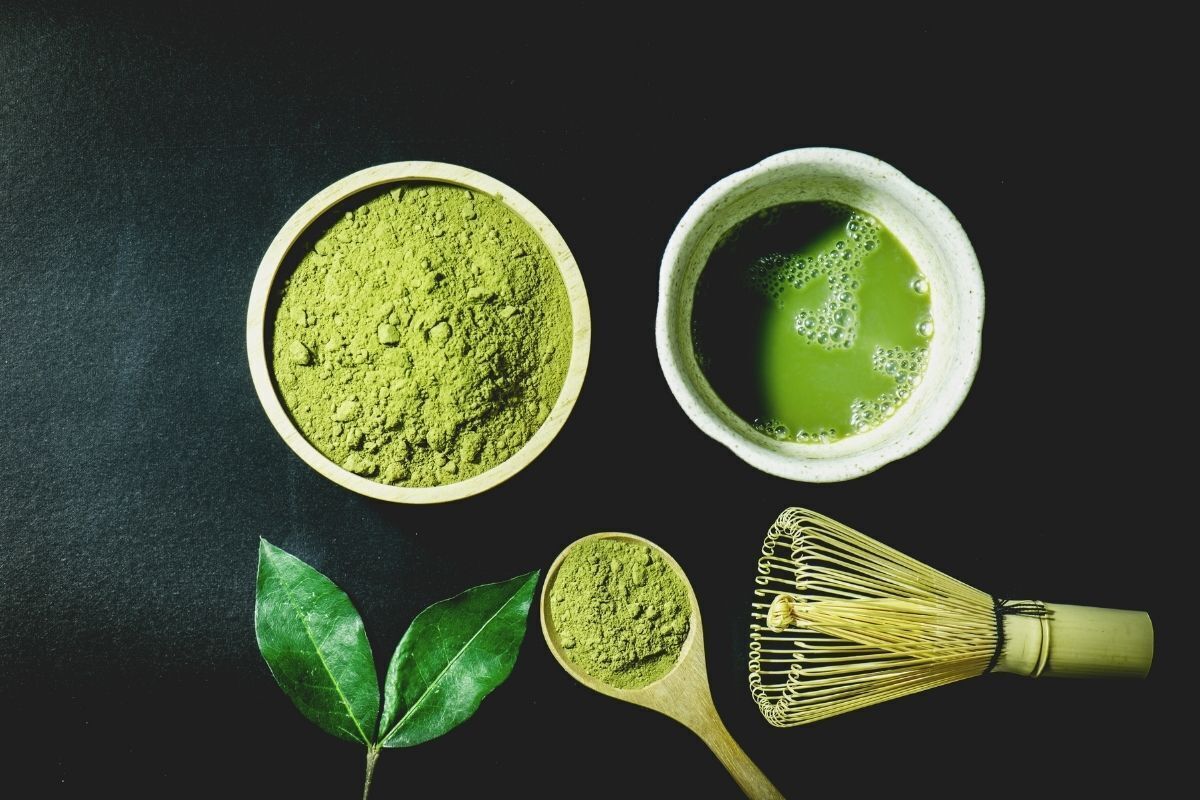
One of the best known teas for its diuretic action, green tea contains in its composition, caffeine, responsible for increasing the amount of urine in the body. Thus, this herb helps combat fluid retention, improving swelling and consecutively, assisting in the process of weight loss.
Ingredients
Use the following ingredients to make the tea:
- 300 ml of water;
- 1 tablespoon green tea.
Directions
The preparation of green tea is simple and takes a few minutes to be ready, for this you will need to boil the water and put a spoonful of the herb. Let it rest with the container covered and wait 3 to 5 minutes. The longer the tea stays in infusion, more caffeine is released, making the taste more bitter.
Therefore, after the stipulated period, keep experimenting until it is to your liking. In addition, due to the presence of caffeine in tea, do not consume it at night, so as not to cause insomnia. Green tea should also not be ingested by children, pregnant and lactating women.
Pineapple tea
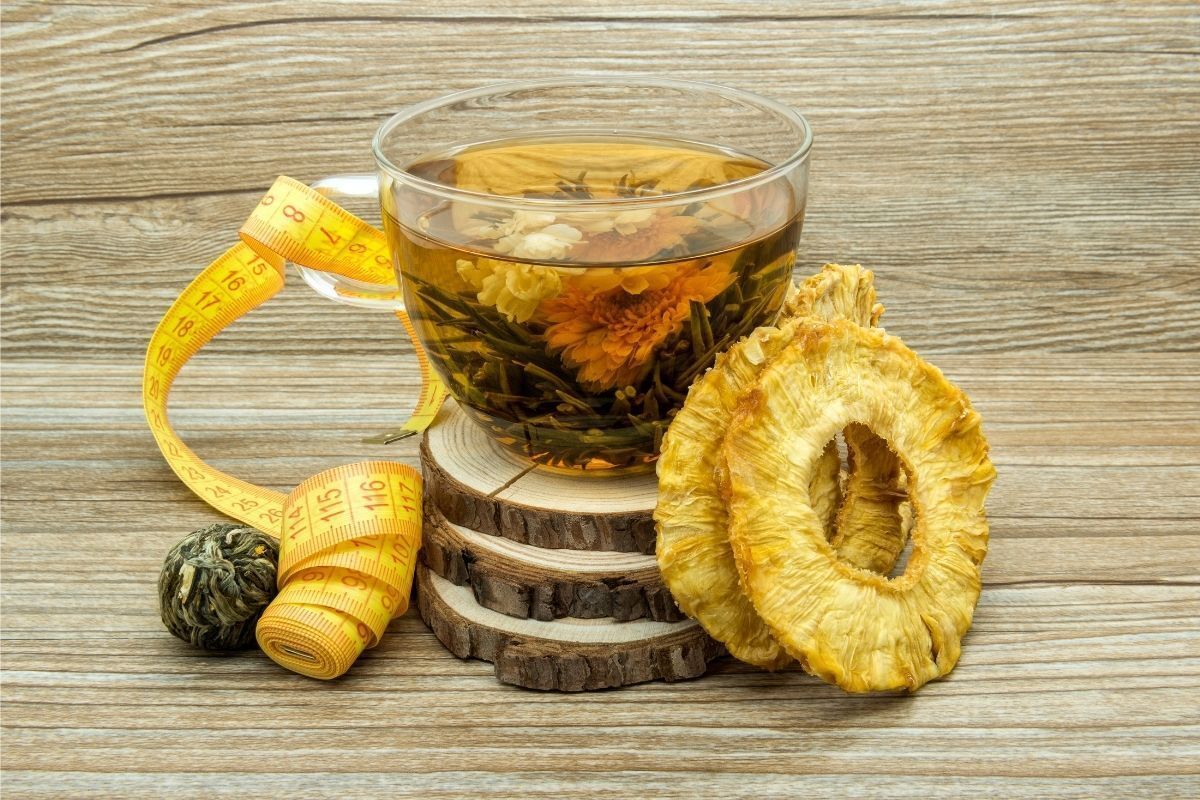
Like other citrus fruits, pineapple contains a high content of vitamins and properties that bring numerous health benefits. However, it is in the peel that is present the highest concentration of its substances, compared to the pulp.
By having diuretic, detox and antioxidant action, the pineapple peel tea cleans impurities from the body, eliminating excess fluid in the body and thus stimulating the metabolic system. So, for those who want to lose weight or suffer from constipation this tea is ideal, besides having a wonderful flavor.
Ingredients
Use the following ingredients to make the tea:
- Peel 1 medium pineapple;
- 1 liter of water.
You can also increase its nutritional and diuretic power by adding cinnamon, clove, ginger, honey or mint if you prefer.
Directions
In a pan, heat the water and when it boils, add the pineapple peel, the herbs and spices of your choice and let it boil for another 5 minutes. Turn off the heat and cover to continue simmering for another 10 minutes. Strain and drink the tea hot or cold three times a day. What remains, store in the refrigerator and consume within 3 days.
Due to the high concentration of acidity in pineapple, avoid taking this tea if you have hypertension, gastrointestinal problems, such as gastritis, reflux and ulcers, for example. In addition, it is not indicated for pregnant women or during breastfeeding.
Corn hair tea
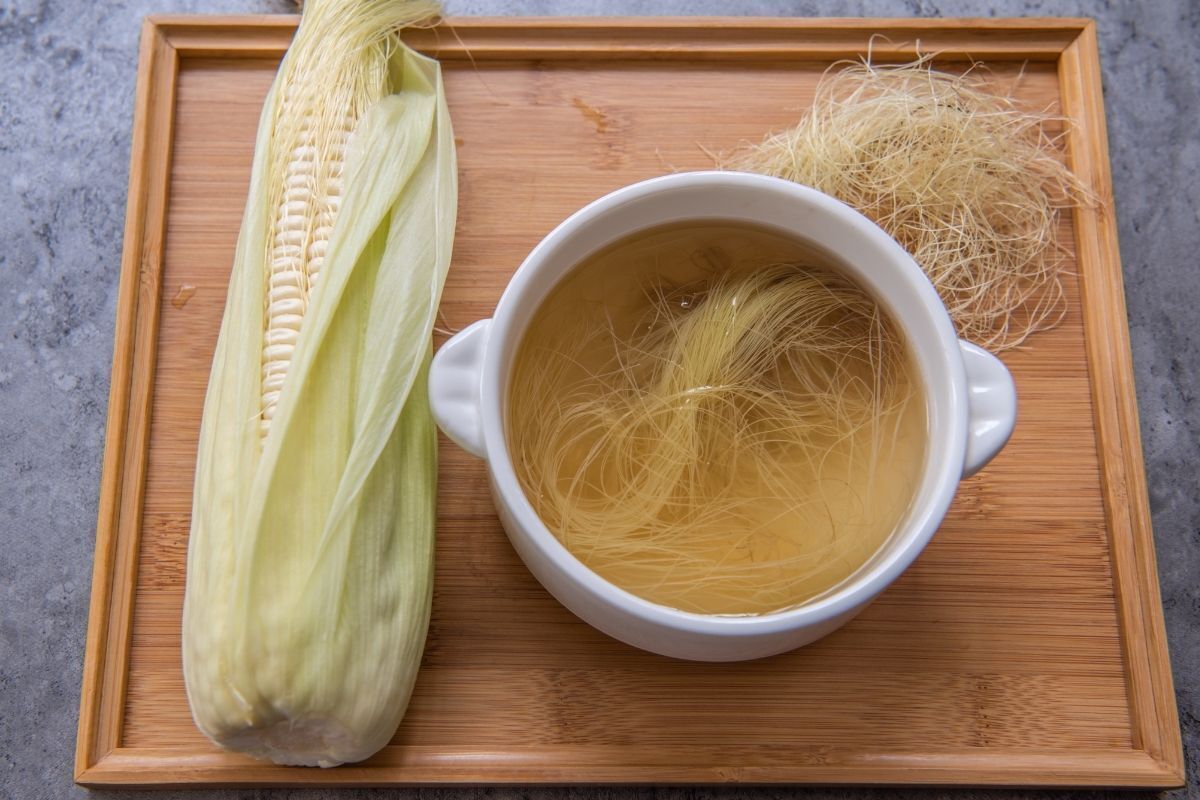
Corn hair is a medicinal plant taken from inside the ear of corn that contains properties beneficial to the body. Being a natural diuretic, the tea made from this herb makes it increase the amount of urine, and thus, preventing and treating diseases, especially of the urinary tract, in addition to controlling blood pressure and balancing the intestinal flora.
Ingredients
Use the following ingredients to make the tea:
- 300 ml of water;
- 1 tablespoon corn hair.
The most common is to use the dry extract of this herb and can be found in specialized natural products stores.
Directions
Add the water and the corn hair in a pot and boil for 3 minutes. Turn off the heat, cover and let it rest for another 10 minutes. Wait for the tea to warm up, strain and consume up to 3 times a day.
Corn hair presents no health risks, but the tea should not be consumed by pregnant women, because it can cause contractions. In addition, people who use controlled medication, to treat high blood pressure, for example, should drink the tea with medical advice.
Ginger tea with cinnamon and lemon
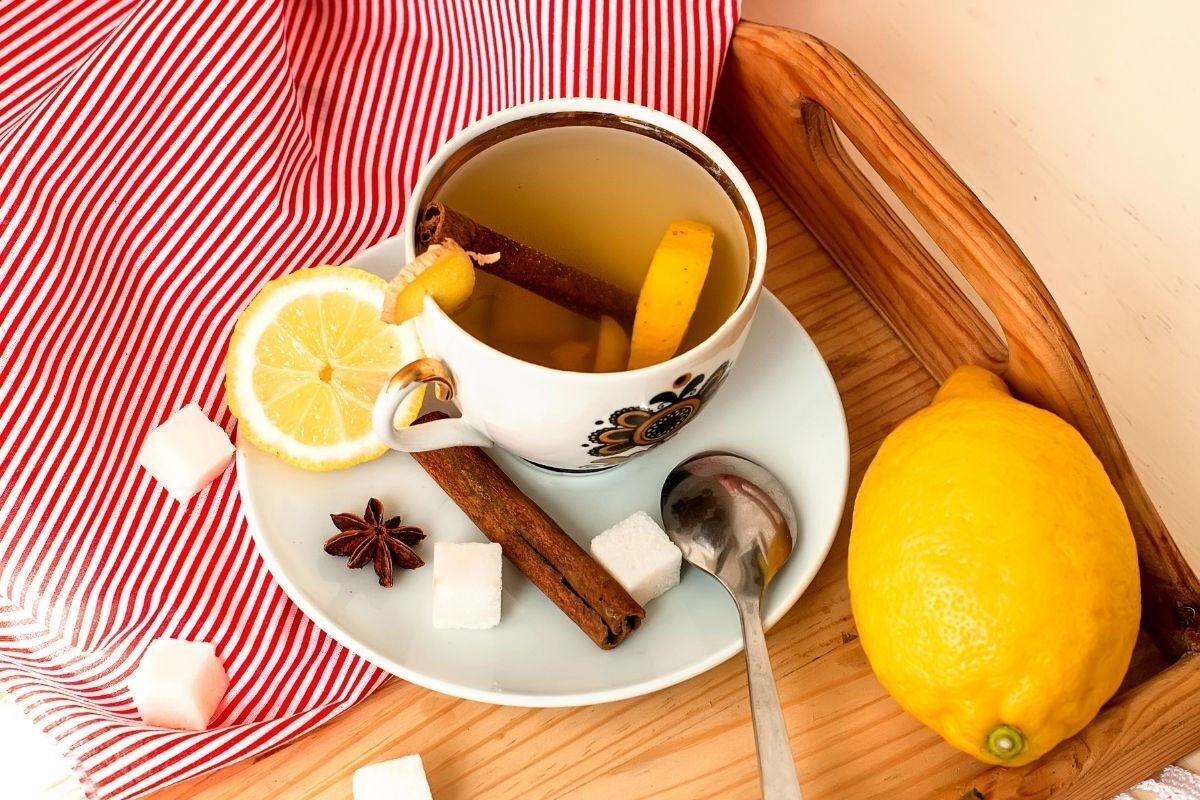
The ginger tea with cinnamon and lemon, besides being very tasty, together they contain several nutrients and diuretic and thermogenic action that help the body to eliminate toxins and fat burning. In addition, this tea regulates the blood sugar level, blood pressure, cholesterol and many other health benefits.
Ingredients
Use the following ingredients to make the tea:
- 1 cup of water (approximately 250ml);
- ½ cinnamon stick;
- 3 slices of lemon.
Directions
Place the water with the ginger and cinnamon in a kettle and let it boil for 5 minutes. Turn off the heat, add the lemon and let it boil for another 5 minutes and it's ready. Drink the tea two or three times a day.
Taking this tea in excess can cause gastric irritation, diarrhea and nausea. In addition, it is contraindicated for those suffering from high blood pressure, poor blood circulation or taking anticoagulant medication, as it increases the risk of bleeding. In addition, pregnant and lactating women can take ginger tea, provided the doctor authorizes it.
Leather hat tea
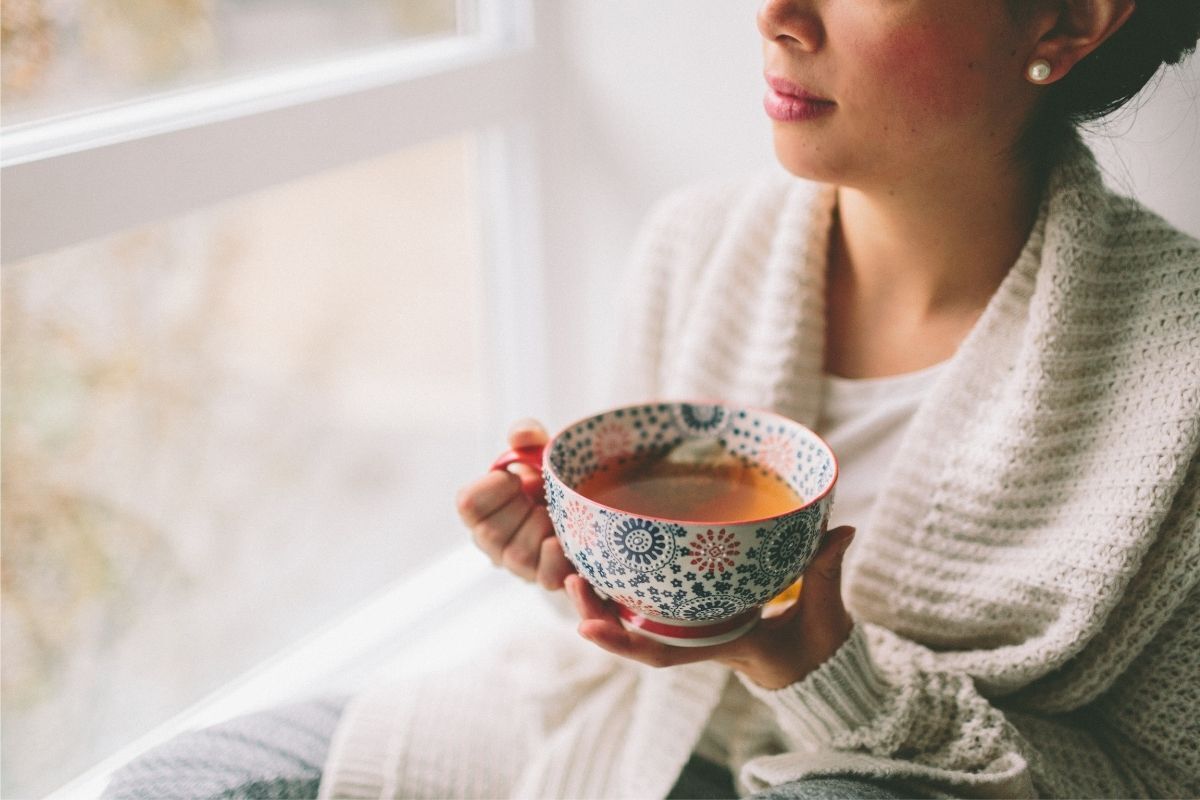
The tea of chapéu-de-leouro acts in the organism as a diuretic, anti-inflammatory, laxative and astringent. There are also several other properties that are indicated in the treatment of several diseases, for example, urinary infection, digestive problem and in the elimination of the excess of liquid in the body.
Ingredients
Use the following ingredients to make the tea:
- 1 liter of water;
- 2 tablespoons of the plant chapéu-de-leouro.
Directions
Boil the water in a pot, turn off the heat and add the leather hat leaves. Cover and wait 10 to 15 minutes while the tea steeps to a pleasant temperature for consumption. This tea can be consumed up to four times a day. However, it is not recommended for people with kidney or heart failure.
Elderberry tea
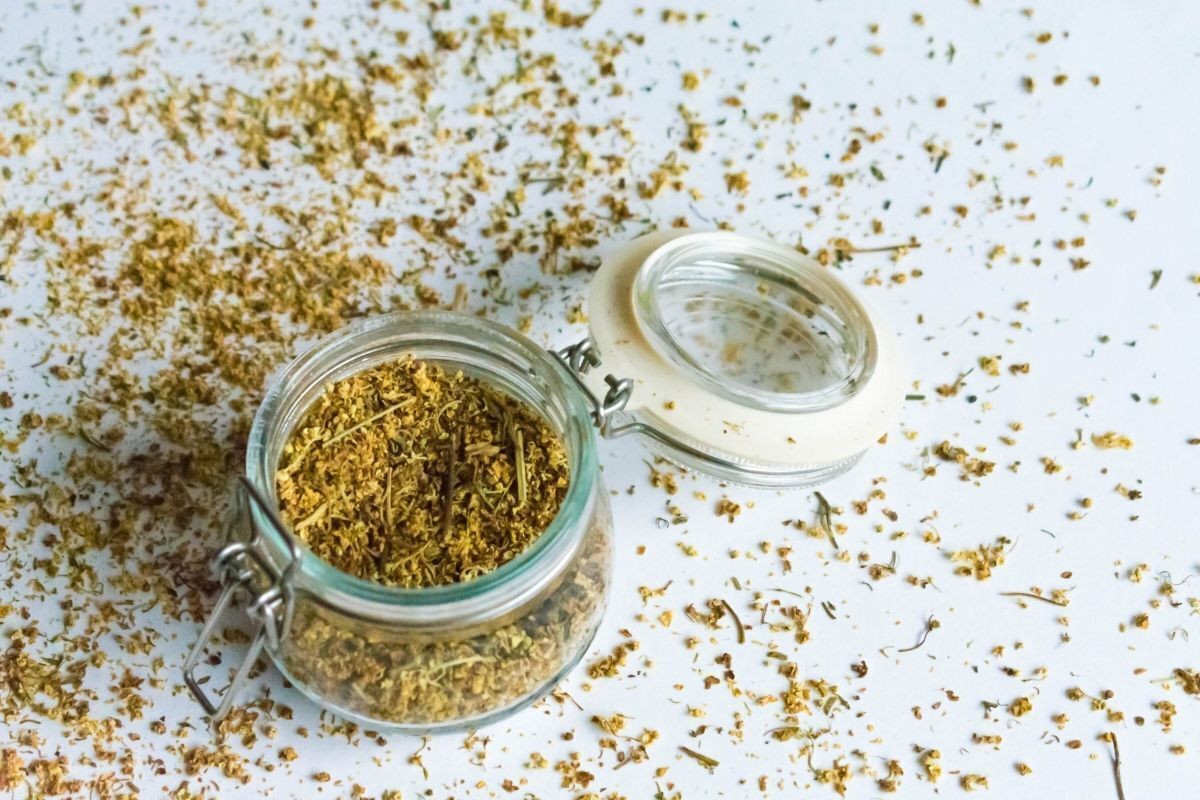
The dried elderberry flowers have substances rich in nutrients that act, mainly, as a diuretic and natural laxative. Therefore, the teas made from these flowers are able to eliminate impurities from the body, regulating the gastrointestinal system and preventing against kidney diseases, rheumatic, flu, uric acid, among others.
Ingredients
Use the following ingredients to make the tea:
- 300ml of water;
- 1 tablespoon of the dried flowers of elderberry.
Directions
First, boil the water in a pot, put the elderberry flowers and turn off the heat. Cover and leave to infuse for 10 minutes. Wait to cool, strain and drink the tea up to 3 cups of tea a day. Remembering that the elderberry fruit is toxic and, therefore, should not be used to make tea. In addition, it is not indicated for pregnant women or those who are breastfeeding.
Nettle tea
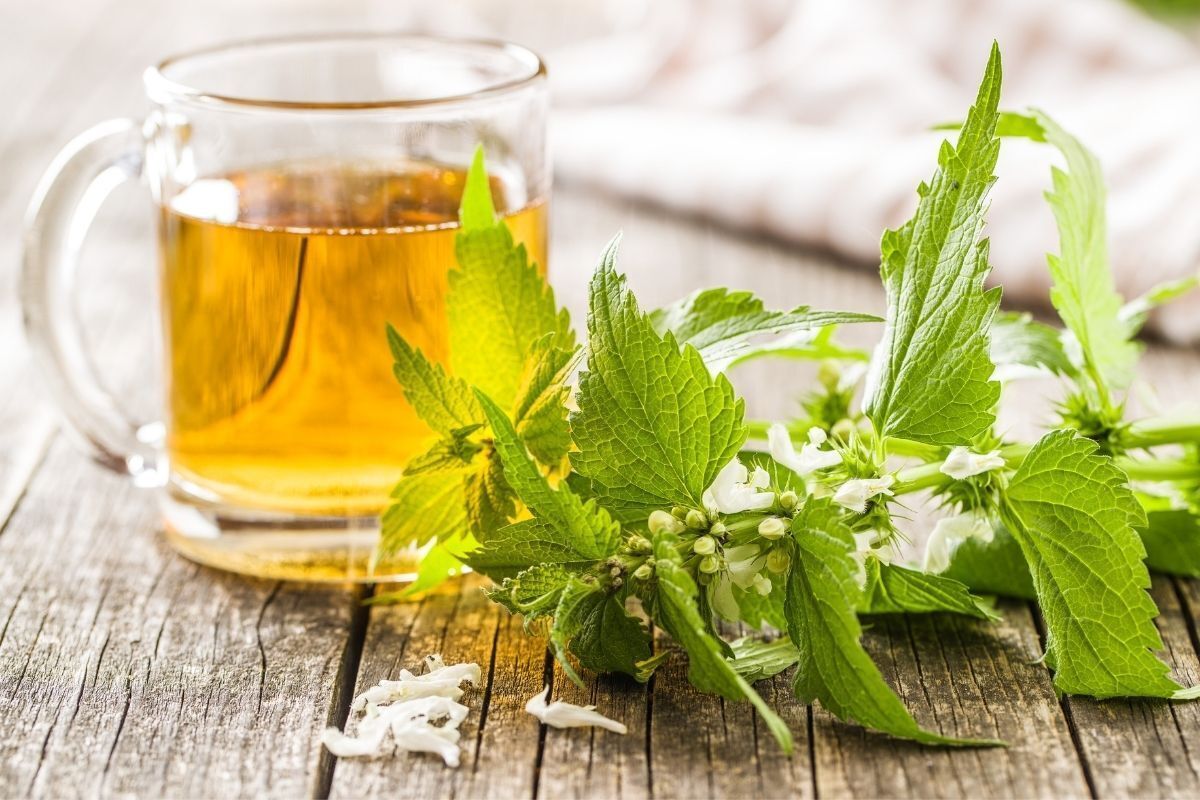
The nettle is a medicinal herb rich in minerals, vitamins and other properties that has diuretic, anti-inflammatory, antihypertensive action, in addition to protecting the immune system. The most common is the use of dehydrated leaves and roots, because it is in them that are concentrated nutrients.
Therefore, the tea of this plant releases the accumulation of sodium and other toxins in the body through urine, besides helping in the treatment of infections, kidney stones, high blood pressure, among other comorbidities.
Ingredients
Use the following ingredients to make the tea:
- 300ml of water;
- 1 tablespoon of the roots or dried leaves of the nettle.
Directions
Boil the water, turn off the heat and add the nettle. Place a lid on top of the container to simmer for 10 minutes. Let it cool down and it's ready. This tea can be consumed up to 3 cups a day.
However, drinking nettle tea in large quantities can cause uterine cramps, especially in pregnant women, which can lead to miscarriage or malformation of the baby. In addition, nursing mothers should not consume this tea due to its toxic effect on the child. People with kidney and heart problems is also not recommended to use the nettle.
Sesame tea
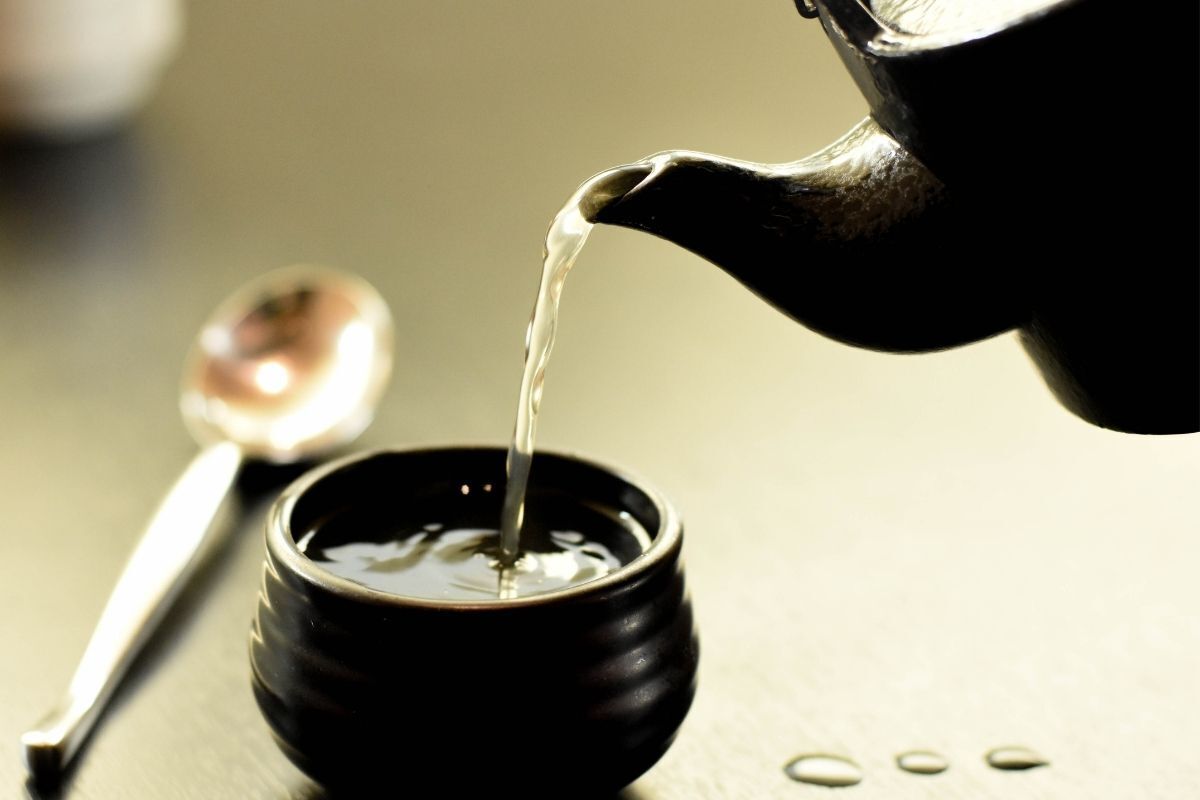
Widely used by Eastern, Mediterranean and African cultures, sesame seeds are a source of vitamins and nutrients that act on the proper functioning of the body, preventing and treating various types of comorbidities. Besides, of course, acting as a natural diuretic, assisting in the elimination of impurities from the body and constipation.
Ingredients
Use the following ingredients to make the tea:
- 1 liter of water;
- 5 tablespoons black or white sesame seeds.
Directions
Start by boiling the water, then add the sesame and let it cook for about 15 minutes. Turn off the heat and cover the tea to continue steeping for another 5 minutes. This amount can be ingested throughout the day, however, as the hours pass there is a considerable loss of its nutrients.
In principle, sesame seeds are safe, but when processed, they can contain traces of other seeds and almonds, causing contamination. Therefore, people with allergies should consume sesame in moderation.
Oxalate and copper are substances present in the seed that can aggravate uric acid and for those suffering from Wilson's disease (copper accumulation in the liver).
What care should be taken with diuretic tea?
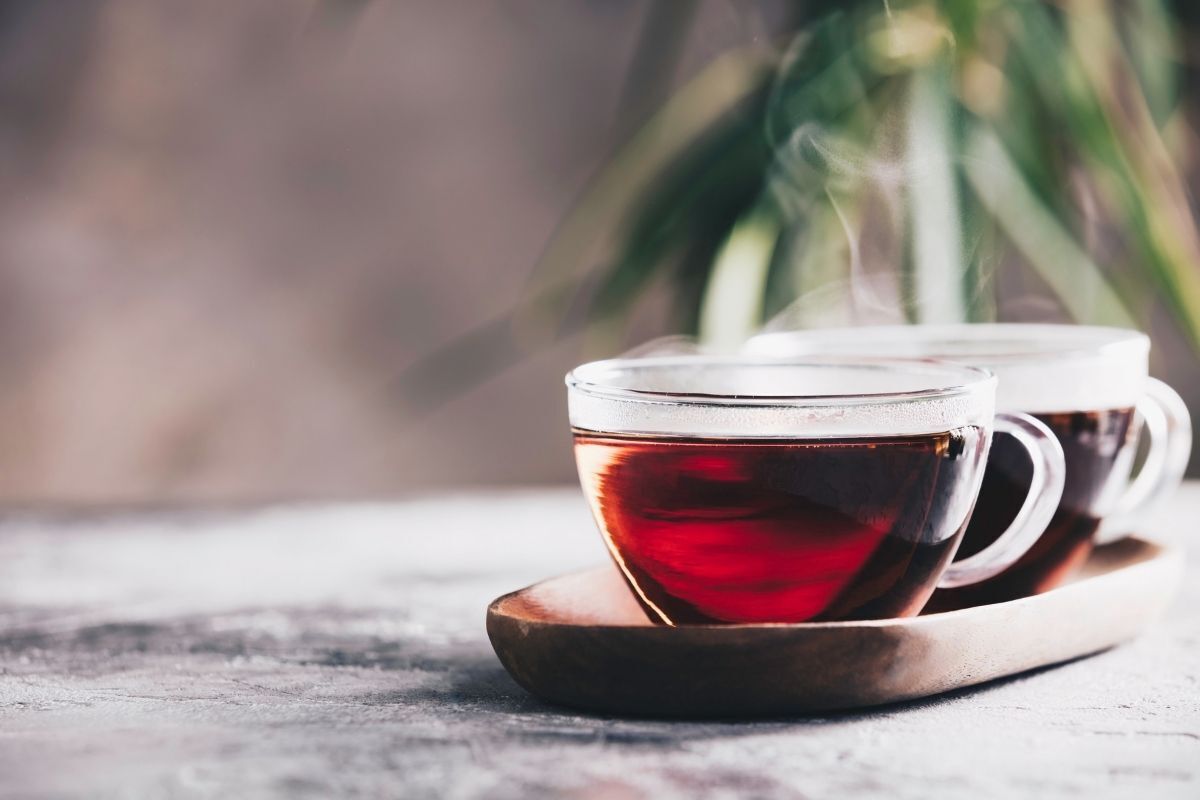
The medicinal plants mentioned in this article, in general, do not present a risk to your health. However, you must take some care. The consumption of diuretic tea in excess tends to eliminate important minerals through urine, causing an imbalance in the body and, in some cases, severe dehydration.
In addition, it is not recommended to consume this type of tea: people with hypertension, kidney or heart problems, pregnant women, women who are breastfeeding and children under 5 years.
This is because diuretic teas can cause cardiac arrhythmia, sudden drop in blood pressure, uterine contraction, leading to miscarriage or malformation of the baby, dizziness and headaches, for example. Moreover, one should not administer the tea together with synthetic diuretic.
Therefore, whether with the intention of losing weight or treating some comorbidity, consume any tea mentioned here, consciously and always under the supervision of a doctor or a phytotherapist.

